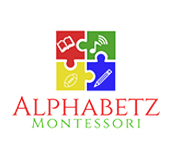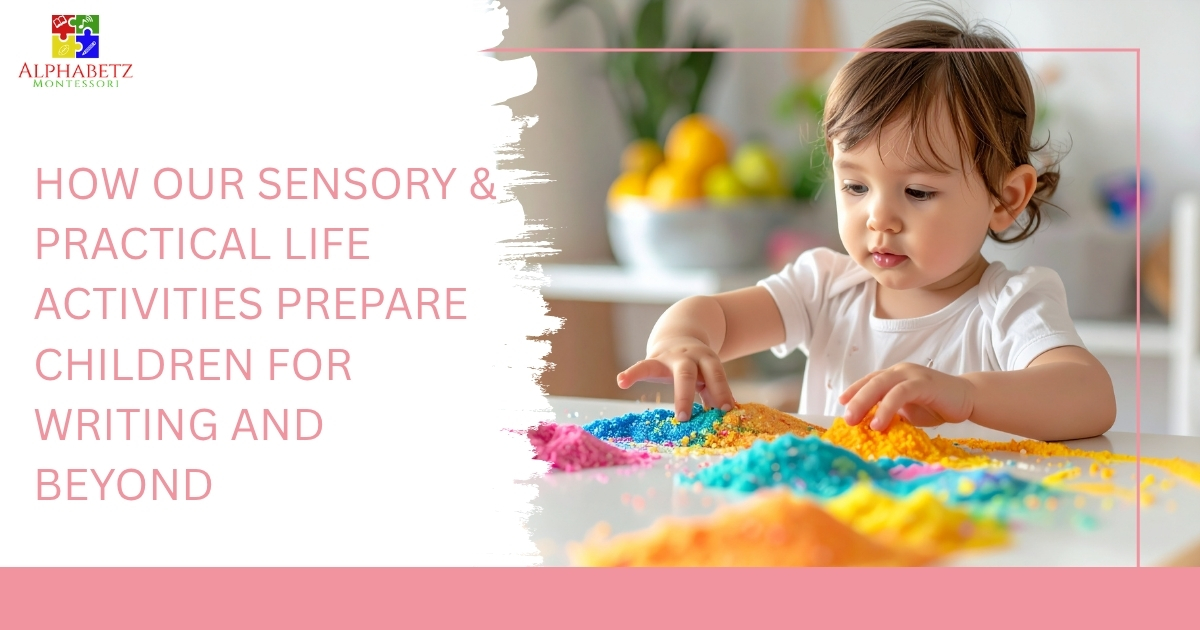At Alphabetz Montessori, we believe that every small movement and every hands-on experience a child engages in plays a vital role in shaping their future academic success. Long before children learn to write letters and form sentences, they build the foundation for writing through fine motor development, coordination, and concentration skills cultivated through Montessori sensory and practical life activities.
The Montessori Foundation: Learning Through the Hands
Dr. Maria Montessori once said, “The hands are the instruments of man’s intelligence.” This philosophy is central to the Montessori approach, where learning begins with movement and exploration. In our classrooms, children are encouraged to touch, manipulate, and engage with materials that strengthen their hand muscles, refine control, and promote independence.
These seemingly simple activities pouring water, spooning grains, buttoning frames, or polishing wood are more than play. They prepare the child’s body and mind for academic work by developing the ability to focus, persevere, and perform tasks with precision.
Fine Motor Development: The First Step Toward Writing
Before a child can hold a pencil or form letters, they need control over the small muscles in their hands and fingers. Our practical life exercises are carefully designed to enhance these movements naturally.
Activities such as
- Transferring objects with tongs or tweezers improves the pincer grasp.
- Threading beads or lacing cards builds finger dexterity.
- Using clothespins or opening jars strengthens the hand muscles required for holding a pencil.
Through repetition and purposeful movement, children gain confidence in their ability to coordinate their actions, a critical step before beginning formal writing lessons.
Sensory Activities: Sharpening Perception and Focus
In Montessori education, sensory work goes hand in hand with fine motor development. Sensory materials such as the Pink Tower, Sound Cylinders, and Color Tablets engage multiple senses, helping children refine their perception of size, sound, texture, and color.
This sensory refinement enhances not only a child’s awareness of the world but also their ability to observe, compare, and classify skills directly linked to reading and writing readiness. For example, when a child differentiates between rough and smooth textures, they are also training their brain to recognize the subtle differences in shapes and letters later on.
The Bridge from Practical Life to Writing
As children grow more confident with their movements, Montessori materials naturally progress toward pre-writing and writing exercises. The Metal Insets, for instance, allow children to trace and draw shapes, helping them control their hand pressure and movements in preparation for cursive or print writing.
Similarly, sandpaper letters offer a tactile way to learn letter formation; children trace the rough surface with their fingers, combining the sense of touch with visual memory. This multi-sensory learning process makes letter recognition and writing intuitive and enjoyable.
Beyond Writing: Building Concentration and Confidence
While developing fine motor control is essential for writing, the benefits extend far beyond. These activities nurture a child’s ability to concentrate, follow sequences, and take pride in completing tasks independently. Each successful attempt at pouring without spilling or arranging blocks perfectly builds self-confidence and inner discipline.
At Alphabetz Montessori, our teachers guide children gently through these experiences, allowing them to move at their own pace while mastering coordination, balance, and attention to detail. These are not just academic skills but life skills that foster independence and resilience.
A Strong Start for Lifelong Learning
The journey from spooning rice grains to writing sentences is a beautiful progression one that unfolds naturally in a Montessori environment. By focusing on sensory and practical life activities, we ensure that children are not only prepared to write but also ready to think creatively, solve problems, and approach learning with joy and curiosity.
At Alphabetz Montessori, every small movement matters. Each activity, no matter how simple it appears, contributes to big ideas and lasting success in your child’s educational journey.

